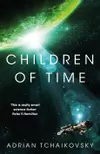
Victor Hugo Kebbe

I’m still seriously thinking about this book. It was clearly a long journey, brightened with several very impressive ideas. Perhaps this is the great merit of Revelation Space, that of bringing an almost infinite succession of impressive ideas in stunning and richly detailed and imaginative scenarios. If I keep thinking about the book, even after it’s finished, I think it’s a quality to be noticed.
However, the book is also marked by the author’s truncated writing. For me it was clear that Reynolds likes to “show and not tell”, which seems like an interesting idea (and very overvalued these days). However, Speculative Fiction books (such as Fantasy and Science Fiction) still depend a little on a more traditional approach, just when the book brings so many innovative ideas. For many and over again I saw myself rereading some excerpts and wondering if I had lost something in the middle of the way.
Some readers complained on-line that the author is long-winded and that the book could be smaller in relation to the number of pages. I don’t consider this a problem, because it was a very slow build up (and that’s ok). However, the author could have been a little clearer and more direct in presenting some of his ideas, but I understand that it is a matter of style.
Update (November, 2025): I read this book a few months ago, and I’m still thinking about it—the main plot, the characters... I got the recommendation from an internet article mentioning books that are similar to the Mass Effect video game series and, in that sense, I wasn’t disappointed at all. It has everything: space archaeology (which is such a cool idea), the feeling that we’re alone-but-not-alone in the universe, the grand scope of things, and the sense that we, as mankind, are nothing compared to the great scheme of the universe, with a huge menace lurking in the galaxy, etc.
In that regard, although I wasn't disappointed with the book, the central revelation wasn't a big surprise to me. I had read John McDevitt’s Engine of Gods earlier, and the plots are quite related. But if there's one idea that truly impressed me, it was the way the Ultras and their technology challenge our contemporary perception of time.
That completely changes everything: the way we think about humankind, how we view ourselves as a society and a civilization, and, crucially, how it transforms and challenges our own consciousness as individuals, deeply affecting our idea of identity. That’s really awesome, and it's still eating away at my mind.
I’m still seriously thinking about this book. It was clearly a long journey, brightened with several very impressive ideas. Perhaps this is the great merit of Revelation Space, that of bringing an almost infinite succession of impressive ideas in stunning and richly detailed and imaginative scenarios. If I keep thinking about the book, even after it’s finished, I think it’s a quality to be noticed.
However, the book is also marked by the author’s truncated writing. For me it was clear that Reynolds likes to “show and not tell”, which seems like an interesting idea (and very overvalued these days). However, Speculative Fiction books (such as Fantasy and Science Fiction) still depend a little on a more traditional approach, just when the book brings so many innovative ideas. For many and over again I saw myself rereading some excerpts and wondering if I had lost something in the middle of the way.
Some readers complained on-line that the author is long-winded and that the book could be smaller in relation to the number of pages. I don’t consider this a problem, because it was a very slow build up (and that’s ok). However, the author could have been a little clearer and more direct in presenting some of his ideas, but I understand that it is a matter of style.
Update (November, 2025): I read this book a few months ago, and I’m still thinking about it—the main plot, the characters... I got the recommendation from an internet article mentioning books that are similar to the Mass Effect video game series and, in that sense, I wasn’t disappointed at all. It has everything: space archaeology (which is such a cool idea), the feeling that we’re alone-but-not-alone in the universe, the grand scope of things, and the sense that we, as mankind, are nothing compared to the great scheme of the universe, with a huge menace lurking in the galaxy, etc.
In that regard, although I wasn't disappointed with the book, the central revelation wasn't a big surprise to me. I had read John McDevitt’s Engine of Gods earlier, and the plots are quite related. But if there's one idea that truly impressed me, it was the way the Ultras and their technology challenge our contemporary perception of time.
That completely changes everything: the way we think about humankind, how we view ourselves as a society and a civilization, and, crucially, how it transforms and challenges our own consciousness as individuals, deeply affecting our idea of identity. That’s really awesome, and it's still eating away at my mind.









